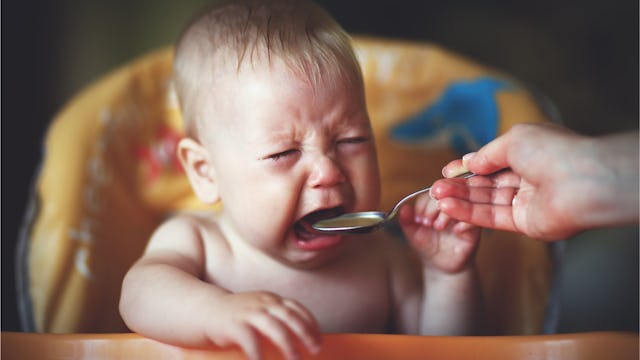The Strange Food Allergy You've Probably Never Heard Of

I’m convinced that food allergy parents are some of the strongest parents out there. They know there is nothing more frustrating than being constantly stressed, worried, and scared about feeding our kids. When my boys were babies, I thought more than once, I just want to be able to feed them normal food and not be so worried about doing something as simple as feeding my baby.
When my middle child was just a few weeks old, I immediately knew something was wrong. His diapers smelled off for a breastfed baby, he was colicky, and he could pass gas like a grown man.
Sure enough, the pediatrician confirmed that my son had a dairy and soy allergy based on blood found in his stool. She advised me to cut all dairy and soy out of my diet, which I did, and he improved.
But when it came time to feed him his first solid foods, I did what all the baby books and parenting sites recommended. I fed him rice cereal despite his protests.
The first time he ingested a good amount, I had a feeling something was terribly wrong. My colicky baby was back, and with a vengeance. It seemed like the rice cereal — a normal, typical first food for a baby — was making him angry. He would scream for hours after eating it while squirming and arching his back in pain. I felt helpless.
The second or third time I tried to feed him the rice cereal, he vomited two hours later in his crib, in the middle of a nap. Then it happened again the next day. I tried switching to an organic oats baby cereal, and his symptoms worsened. He would vomit almost exactly two hours after ingesting the cereal.
I followed my instinct that told me that it was the cereal despite assurances from friends and family that it just couldn’t be that. And I ran across a food allergy called FPIES — it stands for Food Protein-Induced Enterocolitis Syndrome.
Most likely, you have never heard of it. I hadn’t either, and neither had my pediatrician at the time. Two of the most common trigger foods for FPIES kids are rice and oats. The two things I was trying to feed my baby.
I trusted my mom instincts and immediately eliminated all grains from his diet. We stuck with fruits and veggies instead. It took a while for my sweet, cooing boy to come back. It took even longer for him to get on a normal sleep schedule again.
In simple terms, FPIES is an allergy to the protein in foods. The triggers can be any food (which is why it can be such a frustrating thing to figure out), but as I said before, the two most common are rice and oats. I always tell people that it’s kind of like how you can’t give a baby cow’s milk in the first year of life because their stomachs simply can’t tolerate it. My son’s gut couldn’t tolerate rice and oats just like a typical newborn can’t handle cow’s milk.
Several months after following my instincts, I found a doctor who had heard of FPIES, and he confirmed the diagnosis. I was so relieved, but it didn’t really change much. I still went about slowly and methodically trying out foods one by one until they were deemed safe. It was a long, daunting process of food journaling and anxiety as we tried to figure out what foods our baby could tolerate. He basically survived on avocados and breast milk that first year.
One of the main signs of FPIES is a delayed reaction to the trigger food, typically between two and four hours after ingestion. That’s yet another reason why many doctors assume the baby has a stomach bug or other viral infection rather than an allergic reaction to a food they ingested four hours prior.
FPIES is not the same as an anaphylactic type of reaction (although kids with the syndrome often do have other anaphylactic allergies). FPIES is a food allergy that affects only the GI tract. It can be a complete nightmare to deal with because literally any food can be dangerous, and despite not causing anaphylactic reactions, it is still serious. Some kids will have such prolonged vomiting episodes that they become lethargic and dehydrated.
But before you add this to the list of worries you probably already have, know that if you do have an FPIES kid, it’s something that you will get through. Unlike typical food allergies, kids usually outgrow it by age 2 or 3.
The biggest lesson for me in this whole experience? You should never underestimate the power of a mama’s intuition.
For more information on FPIES, make sure to visit the FPIES Foundation.
This article was originally published on